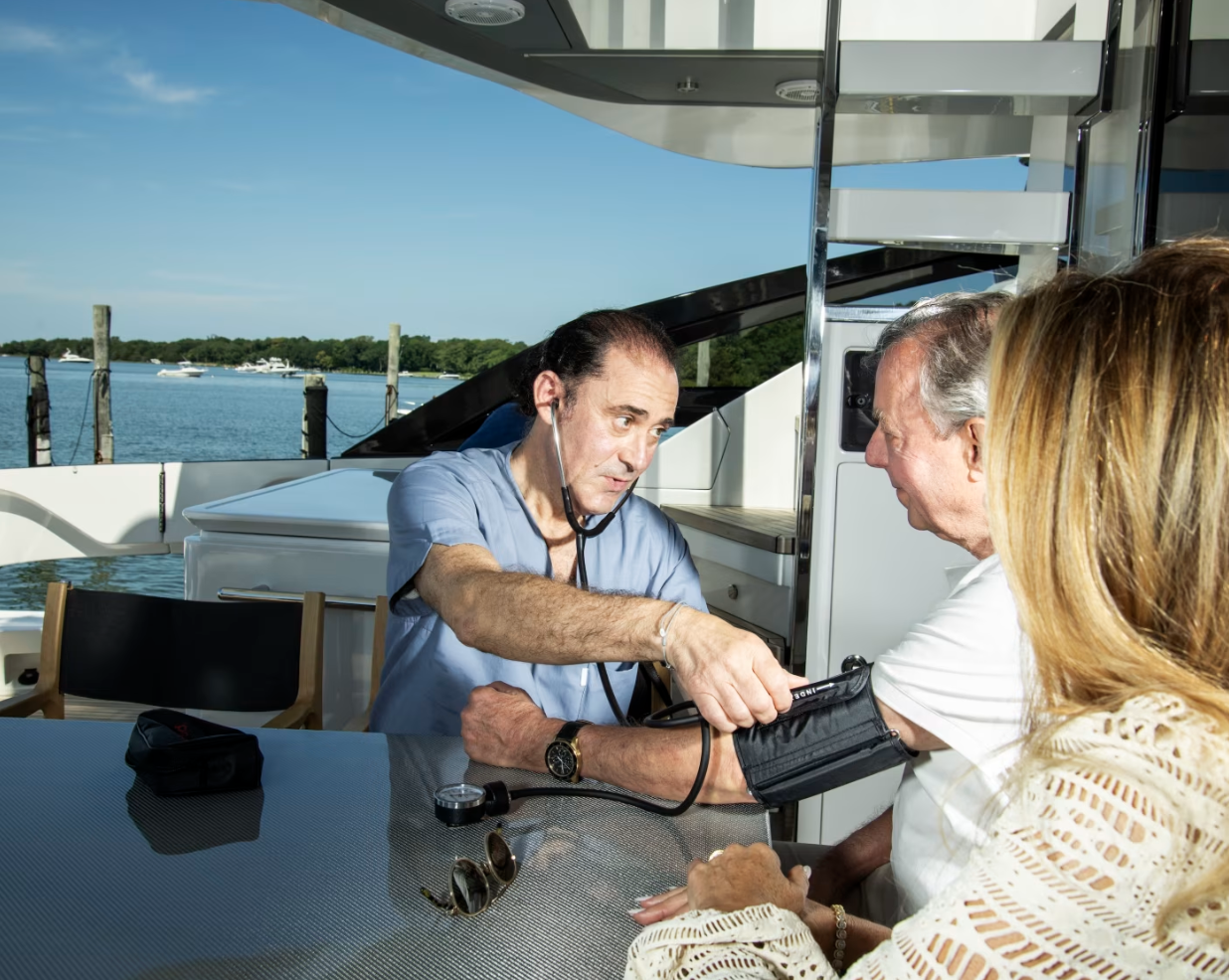On a Saturday in August, Dr. Alexander Golberg boarded a yacht docked in Sag Harbor, New York, carrying his Louis Vuitton medical bag – a gift from a patient. His clients that day were Abe and Giovanna Haruvi, aged 70 and 60, a real estate couple residing in Palm Beach who frequently summer in New York.
Golberg retrieved his instruments, kept medication in a caviar cooler, and administered Botox injections to Giovanna's forehead before giving Abe a general checkup. "We call it 'Boat-tox'," explained Mark, Golberg's son and business partner. According to Mark, some clients consider fillers "emergency cases," requiring the doctor's immediate presence before important events.
Even in genuine emergencies, the Hamptons' wealthy don't wait in emergency rooms. If a house guest sprains an ankle waterskiing or a cousin suffers their nth tick bite, they immediately call one of dozens of doctors who make house calls or even poolside visits.
"This is a medical field most people don't know exists," shared Dr. Asma Rashid of the Concierge Medicine Center of the Hamptons.
Along with millionaire enclaves like South Florida, San Francisco Bay, New York, and Los Angeles, Long Island's East End is experiencing a boom in high-end private healthcare. These doctors offer quick, discreet, and expensive services – charging membership fees from a few thousand USD to six figures annually, with each house call starting at 1,000 USD. Most don't accept insurance.
"Money isn't an obstacle. Private healthcare isn't just faster, it's also more advanced," stated Rashid, a family doctor who has worked in the Hamptons for 15 years. In 2021, she opened a branch in Palm Beach to serve her "migratory" clients who reside in one location during winter and another in summer.
 |
Dr. Alexander Golberg treats Abe and Giovanna Haruvi on a yacht in Sag Harbor. Photo: WSJ |
Dr. Alexander Golberg treats Abe and Giovanna Haruvi on a yacht in Sag Harbor. Photo: WSJ
The Hamptons private medical wave began in 2020 when doctors saw an opportunity to serve the affluent community working remotely from their seaside mansions. The national clinic chain Sollis Health opened a center at a luxury horse farm in Water Mill in 2021. Other options include Casa Health, White Glove Medicine, and private practitioners like Dr. Magdalena Swierczewski and Dr. James Giugliano.
Many advertise themselves as "one-stop shops" for all family medical needs. Some offer cosmetic services, specializing in anti-aging and increasingly popular holistic wellness care. Others rush to White Parties at midnight when incidents occur.
Golberg also practices in Manhattan and Sheepshead Bay, Brooklyn. But in the Hamptons, he and his son Mark truly "live it up," working 24/7 from their black Range Rover. Mark handles the sales side, leveraging connections from his days at the Avenues private school in New York to promote house-call services, including the "Doctor G lift" – a non-surgical facelift, nose job, and buttock lift. According to Mark, the current "hot" therapy is NAD (nicotinamide adenine dinucleotide) injections for increased energy.
Sometimes the requests are too trivial and get refused. Mark complained about Ozempic patients wanting weekly injections in the Hamptons. "I just got a call from someone saying, 'I feel hungover, give me an IV'," he recounted.
Privacy is key for many high-end patients. Golberg and his son spoke of professional athletes wanting to hide injuries from coaches and team doctors, requesting discreet stem cell injections. The consequences of a publicized injury could impact their entire future.
 |
The team of experts and psychologists at Paracelsus Recovery, Zurich, Switzerland. Photo: Paracelsus Recovery |
The team of experts and psychologists at Paracelsus Recovery, Zurich, Switzerland. Photo: Paracelsus Recovery
Beyond physical health, the ultra-wealthy are increasingly spending heavily to address mental health issues tied to the pressures of wealth, from inheritance responsibilities and identity crises to depression and substance abuse. In Zurich, Switzerland, Paracelsus Recovery operates a "one patient at a time" model, offering discreet services in private villas and apartments, costing 105,000 to 135,000 USD per treatment. Clients include Middle Eastern royalty, billionaires, celebrities, and famous athletes. They receive one-on-one attention from a team of 15 to 20 experts (doctors, nurses, therapists, nutritionists, yoga instructors, massage therapists, hypnotists, and trauma specialists) who make data-driven decisions based on tests, biometrics, and daily progress reports.
Paracelsus handles 30 to 40 cases per year, but demand is rising with the booming ultra-high-net-worth population (those with over 50 million USD, increasing from 175,000 to 265,000 people between 2021 and 2021). Internal statistics reveal a 3 to 5 times higher probability of mental disorders and substance abuse in this group compared to the average.
Psychiatrist Thilo Beck (who also works with impoverished and homeless patients) identifies a paradoxical commonality: stigmatization and emotional neglect, one side due to parents lacking time for their children while striving to make ends meet, the other due to growing up in a "glass chamber" with nannies.
He discusses with clients what they consider good for themselves, brainstorming solutions. Then, he implements a therapy type, typically "third wave" therapy. In this approach, addicts don't fight symptoms but welcome them as "guests in their lives." He meets clients for 90 minutes daily to converse and adjust intensity based on individual progress.
"They usually change within one or two months. In other environments, it would take a year," he said.
Clients are divided into two groups: the old money and the nouveau riche. The first group often feels lost, pressured by their parents' success, and ashamed of their relatively ordinary lives. In the second group, the work that made them wealthy sometimes clashes with their work ethic; they often berate themselves, neglect family and friends, and sometimes their own health.
Both groups intersect at the question: "What am I supposed to do in this world?" They often lack purpose, experiencing emptiness beneath the veneer of luxury.
Hoang Dung (According to WSJ, Guardian)












